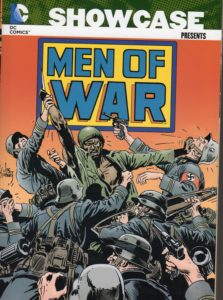Comic Book Review: Showcase Presents Men of War edited by Paul Levitz
In 1977, African-American male leads in mainstream comic books were still countable on one hand (and don’t even ask about African-American women!) But this also had the effect of making a comic with a black person on the front attention-getting. And I suspect that at least some of the creation of “Gravedigger” came from that fact.
Gravedigger was the lead feature in DC Comics’ last-launched war comics series of the Bronze Age, Men of War. He is introduced as Sergeant Ulysses Hazard, a polio survivor who threw himself into intense physical training (including martial arts) to overcome his handicaps. Despite his superior physical condition and combat skills, Hazard was consigned to a segregated battalion and assigned to funeral detail (thus his codename.) After his heroics saved lives (except his best military friend) and defeated Nazi troops, the white officers ignored his contributions and denied his request for reassignment to a combat unit.
In the second issue, Hazard somehow gets back to the U.S. and single-handedly infiltrates the Pentagon War Room to demonstrate his skills. A character identified in that issue as the Secretary of War but in later issues demoted to an undersecretary (as his sliminess would have been a slur on the character of Henry L. Stimson, the actual Secretary at the time) decides to use Hazard as a political pawn. If “Gravedigger” fails on one of the suicidal missions, he can be written off, but if he succeeds, the Undersecretary can take credit.
Now Captain Ulysses Hazard so that he can pull rank when necessary, Gravedigger returns to Europe and takes on a number of commando missions ranging from rescuing art from the Nazis to destroying an experimental mini-sub. There are guest appearances by a couple of DC’s other war comics characters, and the final issue features Gravedigger actually leading Easy Company (normally the job of Sergeant Rock) for a few hours.
Gravedigger was basically “military Batman”, performing superheroic feats on a regular basis. To be fair, this is common in comic books about commando-style solo characters, but if you are a stickler for realism, look elsewhere. Later in the series, he gets a cross-shaped facial scar to give him more distinctive looks, important in comic books. He even gets an archnemesis, Joseph Goebbels, Nazi Minister of Propaganda, who enlists mad science in a massive scheme to rid the Reich of this one commando.
In the next to last story, Gravedigger personally saves the lives of Winston Churchill and Franklin Delano Roosevelt, though an opportunity is missed to have Captain Hazard bond with FDR over their mutual experience with polio.
In addition to the expected violence, there’s also period racism, ableism and anti-Semitism (the last confined to Nazi characters.)
The back-up features varied from issue to issue. “Enemy Ace” featured Baron Hans von Hammer, “the Hammer of Hell”, a World War I German fighter pilot. He was depicted as noble and honorable, one of a dying breed of warrior outdated by brutal modern warfare. Some of the stories have art by Howard Chaykin, who is not as well served by the black and white reprint as the other artists.
“Dateline: Frontline” was about American reporter Wayne Clifford, covering World War Two while the U.S. was still neutral, and having his naivete chipped away bit by bit. He struggles with censorship, the temptation of writing the story to suit the person who can give you access, and the moral gray areas of war.
“Rosa” features a spy working in the late 19h Century who is loyal to no country, and has the habit of switching accents in every sentence either to disguise his nationality or (as he claims in a somewhat dubious origin story) because he is literally a man without a country. His name might or might not actually be Rosa. Most notable for having a character switch sides between chapters for plot convenience.
This volume contains all 26 issues, and is not brilliant but is decent work by journeymen creators. Worth picking up if you are a war comics fan, or interested in the history of African-American characters in comic books.

